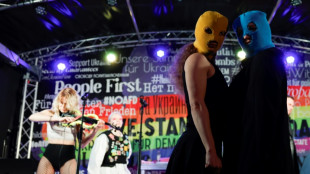
-
 England-born Inglis relishes 'special' century for Australia
England-born Inglis relishes 'special' century for Australia
-
Pussy Riot stages pre-election Berlin show for Ukraine

-
 Leverkusen ease to victory at Kiel to trim Bayern lead
Leverkusen ease to victory at Kiel to trim Bayern lead
-
'Now it's over' says Hermoso after Rubiales found guilty

-
 Germany on eve of vote expected to see far-right surge
Germany on eve of vote expected to see far-right surge
-
Spurs revitalised after Ipswich rout: Postecoglou

-
 Russell misses prove costly as England edge Scotland in Six Nations
Russell misses prove costly as England edge Scotland in Six Nations
-
Milei says welcomes Trump plan for reciprocal tariffs

-
 Premier League title out of Arsenal's control, says 'angry' Arteta
Premier League title out of Arsenal's control, says 'angry' Arteta
-
Asensio double punishes Jorgensen howler as Villa beat Chelsea

-
 Lille deepen Monaco's woes
Lille deepen Monaco's woes
-
Alvarez double takes Atletico top with Valencia win

-
 Norwegian film 'Dreams', Australia's Rose Byrne win at Berlin
Norwegian film 'Dreams', Australia's Rose Byrne win at Berlin
-
French star Jaminet returns after ban for 'stupid' racism

-
 England edge Scotland in Six Nations thriller
England edge Scotland in Six Nations thriller
-
England edge Scotland 16-15 in Six Nations thriller

-
 Israel stalls Palestinians' release after six Gaza hostages freed
Israel stalls Palestinians' release after six Gaza hostages freed
-
Pope suffers respiratory attack, condition critical: Vatican

-
 French convict freed in murderous ambush is arrested in Romania
French convict freed in murderous ambush is arrested in Romania
-
Andreeva, 17, makes WTA history with help from LeBron and Federer

-
 Nowitzki 'disappointed and sad' for Doncic after trade
Nowitzki 'disappointed and sad' for Doncic after trade
-
Japan's Forever Young wins $20mln Saudi Cup

-
 One dead, several police wounded in 'Islamist' knife attack in France
One dead, several police wounded in 'Islamist' knife attack in France
-
Ireland hail supersub energy, Wales see solace in defeat

-
 One dead, several police officers wounded in 'Islamist' knife attack
One dead, several police officers wounded in 'Islamist' knife attack
-
Arsenal's Premier League title hopes suffer Hammer blow

-
 Rublev outlasts Draper to take second Doha title
Rublev outlasts Draper to take second Doha title
-
Inglis trumps Duckett as Australia defeat England in record chase

-
 Israel suspends prisoner release after six Gaza hostages freed: sources
Israel suspends prisoner release after six Gaza hostages freed: sources
-
One dead, several police officers wounded in knife attack in France

-
 Thousands join Hungarians judges' rally
Thousands join Hungarians judges' rally
-
Andreeva, 17, becomes youngest WTA 1000 champion

-
 Arsenal title bid rocked by West Ham, Man Utd rescue Everton draw
Arsenal title bid rocked by West Ham, Man Utd rescue Everton draw
-
Prendergast leads Ireland to victory over Wales in Six Nations

-
 France says convict freed in May shootout arrested in Romania
France says convict freed in May shootout arrested in Romania
-
'Soft' Man Utd have to survive this season, says Amorim

-
 Pakistan coach says 'match-winning' fast bowlers key in India clash
Pakistan coach says 'match-winning' fast bowlers key in India clash
-
Zelensky 'not ready' to sign minerals deal with US: source

-
 Fernandes inspires Man Utd fightback for Everton draw
Fernandes inspires Man Utd fightback for Everton draw
-
France's agriculture show, an outlet for angry farmers

-
 Brignone claims Sestriere giant slalom double after Shiffrin flops out
Brignone claims Sestriere giant slalom double after Shiffrin flops out
-
Two in a row for Merlier at UAE Tour

-
 Clash with Pakistan just another game, says India batsman Gill
Clash with Pakistan just another game, says India batsman Gill
-
Londoners march in support of Ukraine to mark three years of war

-
 Duckett ton drives England to 351-8 against Australia in Champions Trophy
Duckett ton drives England to 351-8 against Australia in Champions Trophy
-
Syrian suspect in Berlin stabbing wanted 'to kill Jews': police

-
 Hamas frees 6 Israeli hostages in latest transfer under truce
Hamas frees 6 Israeli hostages in latest transfer under truce
-
China's EV maker XPeng eyes doubling global presence by year's end

-
 Hamas frees 5 Israeli hostages in latest transfer under truce
Hamas frees 5 Israeli hostages in latest transfer under truce
-
Germany on eve of elections under shadow of US-European rift


France's agriculture show, an outlet for angry farmers
France's annual Agriculture Show has become a hotbed of protest by farmers, exasperated by low produce prices, heavy regulations and global competition, against the government they say doesn't care for them enough.
One of the world's largest agriculture fairs, the "Salon de l'Agriculture" that opened Saturday, attracts some 600,000 visitors over nine days.
The bonanza showcases all aspects of French agriculture which despite the country's rapid post-war industrialisation is still a European leader in the sector.
France is the European Union's top cereal and beef producer, the world's second-largest producer of wine, and makes a staggering 1,200 varieties of cheese.
The sector's gigantic economic role makes the gathering a mandatory stop for French leaders, but also a political minefield, as President Emmanuel Macron discovered to his cost at last year's edition.
During his entire 13 hour-long visit among 1,400 exhibitors and 4,000 animals a year ago, the president was heckled as protesting farmers crashed gates and fought with police, prompting repeated temporary closures of the entire event.
Before cutting the ribbon for this year's show Saturday, Macron met with farming associations, called for "respectful dialogue" and gave assurances that France was still fighting against a free-trade agreement between the European Union and members of South America's Mercosur bloc that has farmers up in arms.
Macron's advisors also urged him to spend less time at the fair than last year to limit the number of potentially hostile encounters.
- 'Won't shake Macron's hand' -
Guy Desile, a 58-year-old cereal farmer in the northwestern Eure region, told AFP ahead of the event that he feared "losing it" as his debts build up.
"I won't shake Macron's hand," said Jean-Philippe Yon, a livestock farmer from northern France, accusing the government of failing to ensure sufficient income for farmers. "We expect concrete steps from the president," he said.
Farmers in the southern Tarn area are running a campaign of turning road signs in the wrong direction in protest against the government, an illustration of the "It's all gone topsy-turvy" slogan that the powerful farming union FNSEA has had printed on T-shirts for its members.
Such protests can be effective. In 2024, after weeks of farmers blocking motorways, then prime minister Gabriel Attal scrapped a planned fuel tax rise affecting the sector although the move turned out to do little to appease the protesters.
The French movement was copied elsewhere in Europe, including in Poland where solidarity with Ukraine began to crumble in the face of unwelcome farming imports from the eastern neighbour at war with Russia.
French statistics show that close to half of the families running farms live below the poverty line, are often deep in debt and depend heavily on government subsidies for survival.
- 'Forced on them decades ago' -
At the heart of the problem lies a rapid and profound change in their business conditions, ranging from new rules linked to climate change and health requirements, to price pressure brought on by big agro-business and cheaper competition from abroad.
"Farmers are being asked to change a system that was forced on them decades ago," said Edouard Lynch, a historian, adding that government support has been insufficient to offset the impact of change.
Structural problems have been compounded by misfortune: Excessive rainfall in the autumn of 2024 caused wheat production to drop to its lowest level in four decades and wine production to fall by a quarter, while livestock was decimated by devastating epidemics.
Macron has been eager to show that the government still has farmers' backs.
He reminded reporters that he was trying to assemble a "blocking minority" of EU members to prevent the Mercosur accord from being implemented.
"Our farmers cannot become an adjustment tool," Macron said.
European farmers are crying foul over supposedly less stringent regulations on the sector in South America, pointing especially to the industry's role in destroying huge swathes of the Amazon rainforest, a crucial buffer against climate change.
Macron also said on Saturday that he would tell US President Donald Trump not to make allies "suffer" with new tariffs when he meets him in Washington on Monday.
French wine and cognac exporters, who sell vast quantities of produce in the US, would be especially hard-hit if Trump makes good on his tariff threats.
burs/jh/cw
L.Janezki--BTB


